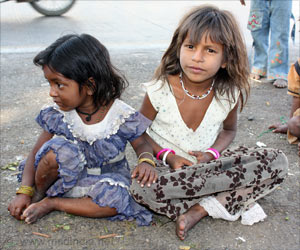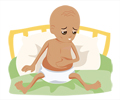Poverty and heightened inflammation work together synergistically, presenting individuals with both factors a compounded impact, essentially a double blow.

Inflammation and poverty as individual and combined predictors of 15-year mortality risk in middle aged and older adults in the US
Go to source) While chronic inflammation and poverty are each known to increase mortality risk, when combined, the two factors appear to have a synergistic effect, producing a greater increase in risk than if the individual effects of the two factors were merely added together, said the researchers from the University of Florida in the US. Their findings appear in the journal Frontiers in Medicine.
‘Although chronic inflammation and poverty independently elevate mortality risk, their combination seems to produce a synergistic effect, intensifying the overall impact. #poverty #inflammation #deathrisk’





"There is a lot of existing evidence that chronic inflammation can lead to disease," said lead author Arch Mainous III, Professor in the department of health services research, management and policy in the UF College of Public Health and Health Professions.
Synergistic Impact: Poverty and Inflammation Form a Double Whammy
"We found that poverty and high levels of inflammation act synergistically, giving people with both factors basically a double whammy. It makes them far more likely to die and in a relatively short period of time, just 15 years," he added.Acute inflammation is part of the body's healthy short-term immune response to fighting infection, toxins or other foreign substances that may enter the body. Chronic inflammation, however, lasts for months or years and has been shown to increase the risk for developing conditions such as cancer, heart disease, Type-2 diabetes and kidney disease.Chronic inflammation can be caused by a host of lifestyle, physiological and environmental factors, such as poor diet, stress, lack of physical activity, smoking, ageing, obesity, autoimmune disorders and exposure to toxins in the environment.
For the study, the team analysed data collected from adults ages 40 and older whose household income fell below the US poverty line and whose lab tests showed elevated levels of C-reactive protein, an indicator of chronic inflammation. Records were linked to the National Death Index to track mortality over a 15-year period.
Those individuals living with both chronic inflammation and poverty had a 127 per cent increased risk for dying from heart disease and a 196 per cent increased risk for dying from cancer. People living with chronic inflammation or poverty, but not both factors, had about a 50 per cent increase in mortality risk over the same period.The findings highlight the need for routine chronic inflammation screenings in vulnerable populations to limit what are, in many cases, preventable deaths, said Mainous. Currently, there are no clinical guidelines for chronic inflammation screening.
Reference:
- Inflammation and poverty as individual and combined predictors of 15-year mortality risk in middle aged and older adults in the US - (https://www.frontiersin.org/articles/10.3389/fmed.2023.1261083/full)














